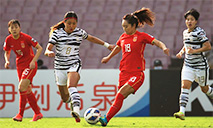Gu Ailing creates mania with confidence, passion after historic gold medal
With International Olympic Committee (IOC) President Thomas Bach's applause and the cheering of flag-waving audience, China's 18-year-old freestyle skier Gu Ailing Eileen, with hands on her head and a look of great excitement, captured the gold medal of the women's freeski big air final at the Beijing Winter Olympic Games.
The win not only brings Team China to the top of the current Olympic medals table, with the host country having won three gold medals, but is also a historic achievement as Gu is China's first women's Olympic gold medalist on snow sports.
"This is the best moment in my life, moments like this make everything so worthy," Gu said in a post-game interview and she thanked the home audience for their huge support.
Gu's performance was steady and faultless in her first two runs, giving her a good score.
On her final run, which made Chinese spectators breathless, Gu nailed a double cork 1620, with unprecedented difficulty, to take over first spot, surpassing Mathilde Gremaud of Switzerland who finished third and Tess Ledeux of France who got the silver.
With a combined score of 188.25 points - 93.75 from her first run and 94.50 from the third - Gu came back strong from third place before the final run to take the gold as the event made its Olympic debut.
"It was a breathtaking competition to see this level of performance," said Bach, who witnessed the historic moment. "I can't imagine what must have gone into her head before doing it."
Gu is also favored to win gold medals in the women's freeski slopestyle and women's freeski halfpipe skiing events.
"All the elite athletes were trying to do the higher difficulty, and only Gu succeeded. That is why she is the champion … This gold will create a psychological advantage for Gu in the next two events," a Beijing-based sports commentator said.
However, Gu, who was lauded in China, was attacked by the US media as a "traitor" because of her background of being born in the US. Some observers said a rising China is more inclusive and open-minded than the US, which once boasted for its diversity as a country of immigrants.
'Everyone loves her'
Many observers have noticed that besides the almost invincible table tennis team, China hasn't seen a super star in sports for a long time since swimmer Sun Yang's suspension. And that's why Chinese sprinter Su Bingtain's record of 9.83 seconds in the 100-meter run made him the talk of the town, even though he didn't finish on the podium at last year's Tokyo Olympics.
The new icon is Gu. Amid the festive atmosphere of the Chinese Lunar New Year season, topics on Gu's gold medal exploded like fireworks as the 18-year-old prodigy, on the day she snatched the gold medal, occupied about 30 of the top 50 topics on the trending list, even including discussions on her grandmother's birthplace and her habit of 10-hour sleep.
Gu's gold medal inspired Chinese netizens on Sina Weibo, in which discussions about her exploded with over 670 million views and millions of comments about an hour after her historic victory.
Aside from being born in the US to an American father, Gu is like most other new-era Chinese teens: They love to post selfies on social media platforms; they like fancy food, travel and fashionable outfits. The prodigy was admitted to Stanford University with a near-perfect SAT score in the run-up to the Winter Olympics.
Some netizens said she is the masterpiece combination of Eastern and Western education, some said she is a perfect image that could not even be designed in a movie, while some others said she is so close to our lives that both her excellence and imperfection seem very real.
"Every time I see her on TV, she's smiling and confident and optimistic, which is really inspiring to us," said a Weibo user.
"Everyone loves Gu Ailing… She has a kind of affinity to peers… She said that she loves to sleep, and she doesn't like to clean her room, and this kind of attitude about imperfection resonated with us," a fan of Gu, surnamed Yang, told the Global Times on Tuesday.
The harvest of medals and applause has been reflected in Gu's commercial value. According to media statistics, in 2021, she signed up with about 30 domestic and foreign brands, and she stands to earn over 100 million yuan ($15.7 million).
The fact that cross-cultural athletes are representing China and gaining widespread support from the country's younger generation reflects the open-mindedness of the country as a whole, Ren Hai, an expert on the Olympic Movement, told the Global Times on Tuesday.
In fact, except for Gu, a large group of young Chinese who appeared at the Tokyo Summer Games and Beijing Winter Games broke some stereotypes, like looking stubborn and introvert.
Chinese snowboarder Su Yiming won the silver medal on Monday. When asked by the media if he thought the rating was too low, he said, "I don't care about that."
The summer of 2021 also saw a host of cute, young people come into the public eye and be loved, such as Yang Qian, a shooter with a cute manicure and hairpin, and Quan Hongchan, a young diver who loves snacks.
"They are younger, more positive and with more characters," Ren said. He noted that they are not quite the same as the Chinese athletes of the old generation, which reflects the diversity of the current society.
Geopolitical vortex
On July 19, 2013, a girl who was coming to 10 signed up on Weibo with the nickname "frog princess Gu Ailing," and she has posted some pictures of her skiing competitions.
The nickname came from Gu's first helmet when she started skiing, which was green and had a crown and a pink hair pin on it, according to media reports.
Gu first went into public view on June 6, 2019, when she announced on Weibo that she would represent Team China in the Beijing 2022 Winter Olympics. In the same month, Gu changed her registered nationality from the US to China on the official website of the International Snow Federation (FIS).
Due to the sensitivity on switching nationality and lack of attention on winter sports, Gu did not attract much enthusiasm in the first place.
Over the next two years, she won 12 gold medals for China. More and more people become familiar with Gu, a girl who loves to eat dumplings and Peking roast duck, especially when they found out that Gu's Putonghua with a Beijing accent is "more standard than my own."
And no one in China doubted her from a patriotic standpoint. Some have noticed that there's a "Chinese dragon" on Gu's outfit to win the gold medal.
The night before Gu won the gold, she fought back against US Media Insider's Instagram account, as the media fabricated that Chinese netizens are attacking figure skater Zhu Yi, who chose to represent China instead of the US, but failed to have a perfect Olympic debut.
"As someone who actually uses Chinese social platforms I'm going to say right here that over 90% of comments are positive and uplifting," Gu said.
But some US media outlets dropped their final hypocrisy and attacked Gu to defend the US' fragile dignity. CNN highlighted Gu is "undeniably American" while media like Fox said Gu was "ungrateful" and even "shameful" in exchange for money with a US passport.
The choice of Chinese nationality reflects Gu's belief that conditions in China are more conducive to personal development, as well as China's progress, Li Haidong, a professor at the Institute of International Relations of the China Foreign Affairs University, told the Global Times on Tuesday.
Chinese society is inclusive enough to respect the individual choices of any athletes, said Li. "There are many athletes who speak China's northeastern dialect but do not represent Team China at the Olympics. We wish all athletes success."
Sports should not be politicized or ideological, but should aim at enhancing understanding, promoting the progress of sports and realizing the athletes' potential, Li said.
"Gu's success should not be attributed solely to the US system and environment," Li said. "We should take note of the highly international nature of the sport and the environment that China has provided her."
Photos
Related Stories
Copyright © 2022 People's Daily Online. All Rights Reserved.










